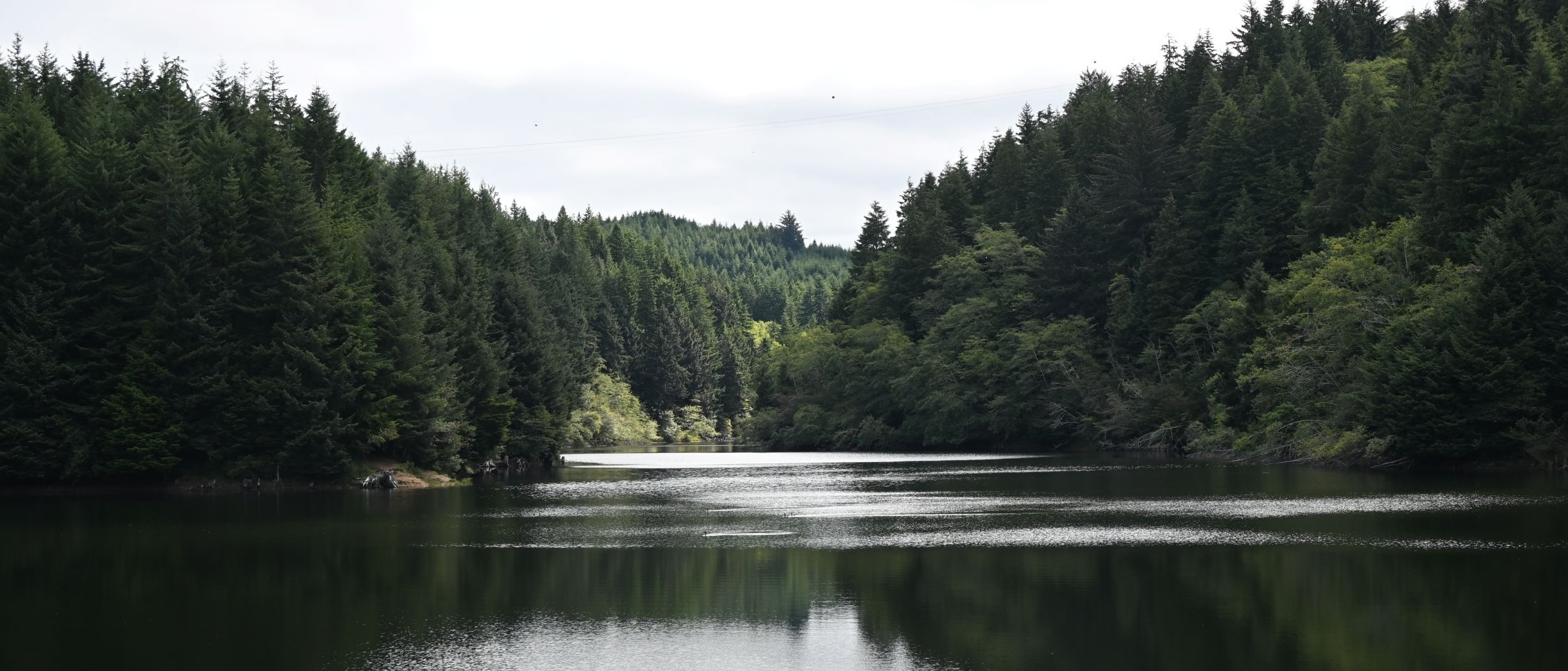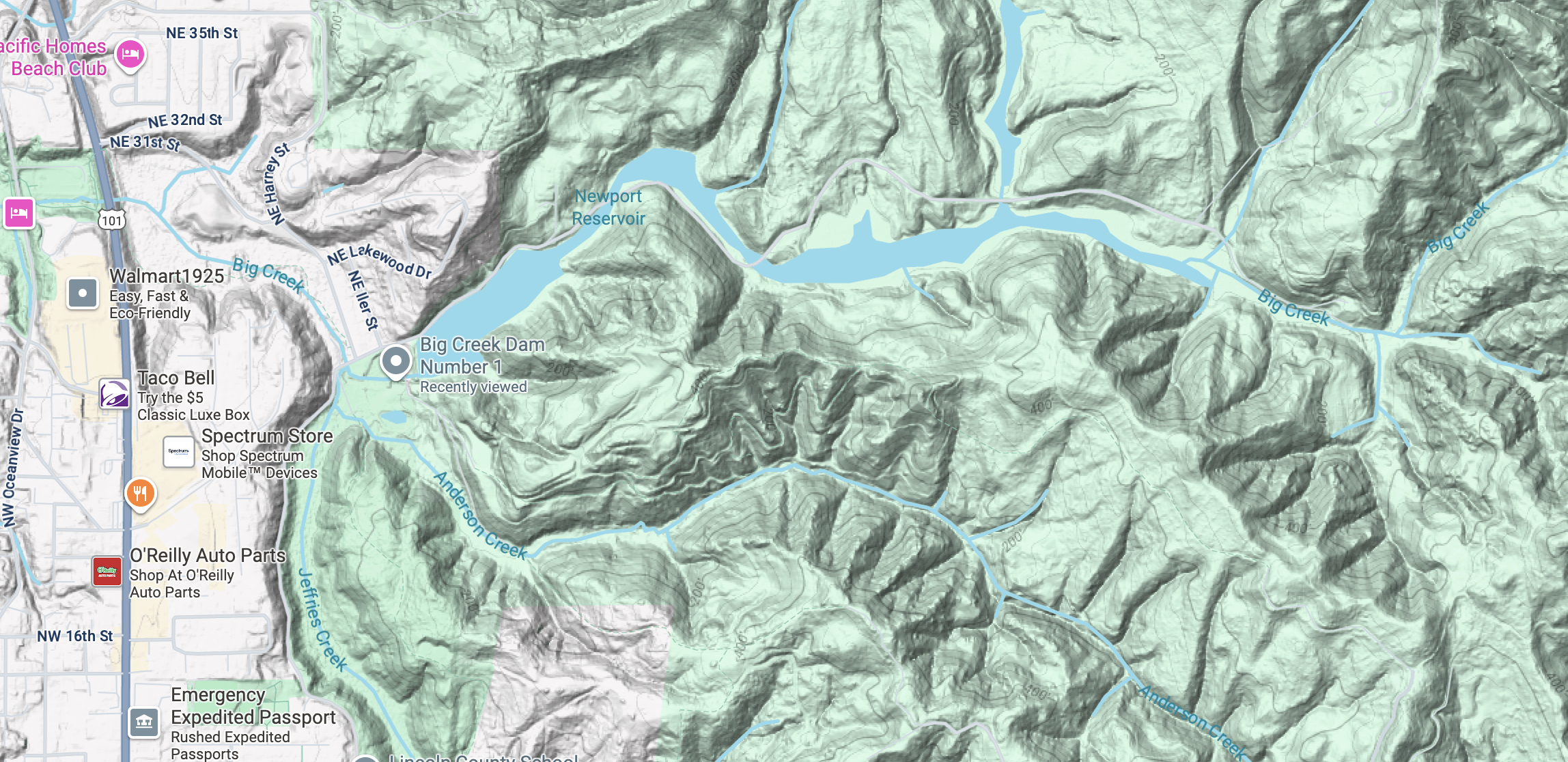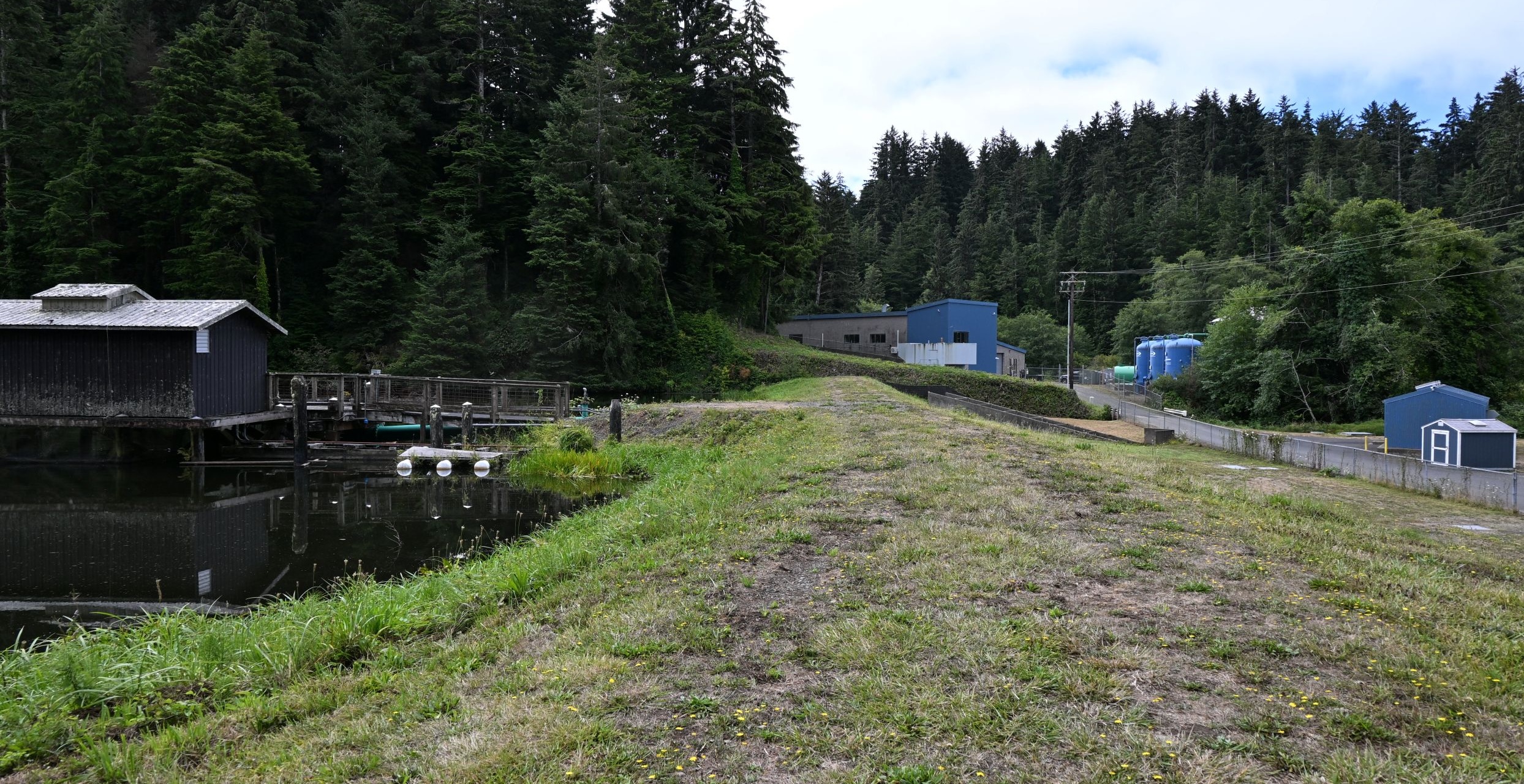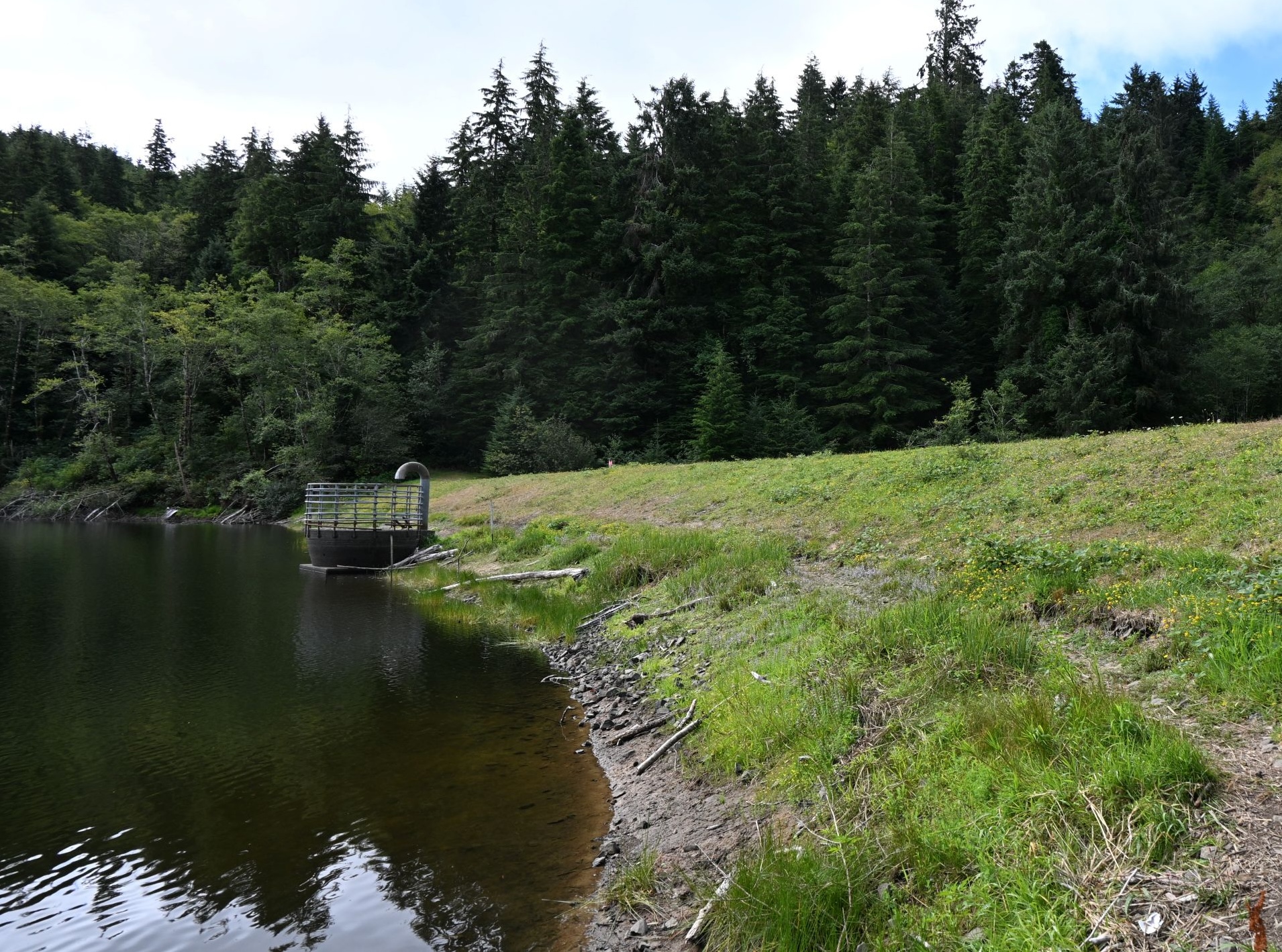
By SHAYLA ESCUDERO/Lincoln Chronicle
NEWPORT – A family in lawn chairs fishes on the bank of picturesque Big Creek Reservoir as a clear blue sky reflects across its water.
Nearby, city engineer Chris Beatty stands on the earthen dam that holds back millions of gallons of water, painfully aware that should a large earthquake strike, the ground below his feet would give way like a puddle of mud and there would be nothing stopping the torrent that would destroy all in its path and drain the city of its sole source of drinking water.
The city has been aware of this fact for more than a decade when they began constructing a new water treatment facility nearby and discovered that the soil surrounding the two earthen dams was not stable and would easily collapse during an earthquake.
Since then, the city has been drafting plans to construct a seismically sound concrete dam – a project that now carries a $185 million price tag.
The complicated project, which only has only reached a 30 percent design milestone this year, involves working with multiple governmental agencies, mitigating fish passage, hiring engineering experts and ever-increasing costs.
Now, in the face of funding issues, the city has decided to spend $476,000 to hire a consulting firm to make sure that building a concrete dam really is Newport’s best option.

Dam problems
Sitting northeast of Newport, water flows from several creeks and collects at two Big Creek reservoirs, a stone’s throw away from Big Creek Park and the city’s Ocean to Bay Trail.
Behind two earthen dams sits about 50 million gallons of water – the city’s sole water supply serving 10,000 residents. Water from the dams is carried to the treatment plant where it is cleaned before making its way to residents, businesses and motels.

During a tour, Beatty stands on the grass covered upper dam and points to a probe sticking out of the earth used for soil testing. That type of test is how the city first discovered the dam’s potential to collapse, he said.
In 2010, the city began constructing a new water treatment facility and conducted soil tests. After several soil investigations from 2011-2015, lab tests and engineering reports revealed that the soil was soft, would loosen and deform during an earthquake and cause the dams to fail.
The main concern highlighted that a loss of water supply would pose a long-term risk to public health, affecting 10,000 to 50,000 people a day indefinitely.
The city looked at several options to fix the issue and in 2014 chose to build a more seismically resistant concrete dam. Since then, engineers have started designing the project – a process taking several years and millions of dollars.
“It’s a big project and it’s expensive,” Beatty said, “There are a lot of moving pieces – several governmental agencies, fish passage and increasing costs.”

Ballooning construction costs
During a city council work session in June, engineers from HDR Inc., a Nebraska-based company with 200 offices around the world, gave councilors an update on the dam’s design. The design had reached a 30 percent milestone, and estimates of construction costs now reached $185 million – a separate figure from the cost of the design and $60 million more than the last estimate just two years ago.
The design has several components including dam removal, fish passage mitigation, cost estimates and dam construction, Verena Winter, HDR project manager explained.
The city is required to restore fish passage with the changes they are planning that may impact salmon, trout and lamprey. They are looking at seeking a waiver for fish passage at Big Creek Dam and helping fish passage within a close radius of the project instead, Winter said.
There are several factors driving the cost, including inflation and the increase in cost of materials like concrete that are affecting all construction projects. Other factors have to do with discoveries during the design phase – poorer foundations than expected and the cost of having to move water to reshape the reservoirs.
The city has invested its own money in the design process, and lobbied at the Oregon Legislature and federal officials in Washington D.C. But the money committed so far only covers the design and not construction or total project cost.

Are there alternatives?
Now, the city is re-evaluating if building a concrete dam is really Newport’s best option. It’s been about a decade since they looked at the alternatives.
“A lot can change in that time,” Beatty said. “A lot was discovered in the design phase.”
Another factor is the declining likelihood of receiving enough federal and state help, he said.
Past alternatives included desalination of ocean water, a costly procedure previously estimated to be $113 million. Treating wastewater was another option but likely wouldn’t go over well with public perception, a presentation to the Newport city council noted.
If the city doesn’t correct the issue, the Oregon Water Resources Department will require the reservoir’s water to be drawn down to a level so that the dams no longer present a hazard. But, drawing down the reservoirs would mean the city can’t keep up with the demand for water.
Now, the city wants to see if a 10-year-old recommendation to construct a concrete dam still holds up.
“Due to the age of the alternative analysis and the increasing cost estimate, the city desires to have the services of a professional consultant to develop and assist in preparing an alternative analysis…” Beatty said at the Aug. 4 city council meeting.
Council unanimously approved a motion to award a $476,000 contract to Jacobs Engineering to conduct an alternatives analysis.
Time running out?
The city has tried to deal with the issue with increasing urgency over the years. A city-made website touts the slogan “Save our Supply” and details the consequences if Newport doesn’t fix the dams. It also has video models of what the aftermath of an earthquake would look like with the dam’s failure and water spilling over U.S. Highway 101 just to the west.
The 2021 Legislature awarded the city $14 million to help fund the new dam’s design.
Earlier this year, Mayor Jan Kaplan appealed to the Oregon Legislature’s Joint Committee on Ways and Means for more support. In March, several city council members traveled to Washington D.C. to appeal on the federal level but with little success.
It’s been more than a decade since issues with the dam were first realized. And for those who live closest to the problem, it’s a long time to wait.
Norm Ferber built his house with his sons’ help only a few years before the city found out their dams could fail in a strong earthquake. He remembers exactly where he was when he found out. His neighbor had seen the front page of the newspaper and was calling him while he was in a store aisle buying rain gear. Ferber wasn’t panicking, but he did get himself a lawyer.
The city periodically has met with Ferber and his neighbors to communicate new developments. But with the conscious threat of losing his house to building a new dam has left his family in limbo. If he wants to sell his house he would only be able to market it to the city of Newport.
“We are kind of in a rock and a hard place,” he told the Lincoln Chronicle.
At the August city council meeting, Ferber realized that even more time had passed than he originally thought. He didn’t want to seem adversarial, and didn’t want to stop the project, he said, but he pointed out that the studies have been going on since 2011.
“Everyone appears a little grayer than when I started this process,” he said. “I want to ask how many of you would be willing to go through this process that we have been going through for the last 14 years.”
- Shayla Escudero covers Lincoln County government, education, Newport, housing and social services for Lincoln Chronicle and can be reached at Shayla@LincolnChronicle.org





















Oregon Government loves to waste money on talking about doing things but they actually never do anything. The problems get worse, they talk about it some more and launder the money around while nothing gets done. I see you.
Constructed (reinforced concrete) reservoir(s) should be an alternative consideration to a dam in light of our seismic activity risks and these high construction costs.